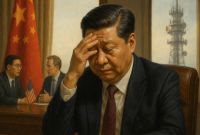Why China’s ‘Dream’ Campaign Isn’t Resonating

China's "China Dream" campaign, championed by President Xi Jinping, has struggled to gain traction as skepticism grows among the Chinese populace. Despite Xi's promises of a brighter future, the past decade has seen worsening conditions for many citizens. In 2012, China's economy was thriving, but by 2023, it faces significant challenges: high youth unemployment, declining confidence, and a looming debt crisis.
The Chinese Communist Party (CCP) once fostered economic growth by opening up to Western investment, but over time, it seized successful companies and transformed them into inefficient, state-owned enterprises. These "zombie" companies, repeatedly bailed out by state banks, have contributed to an unstable financial system. As the CCP shifts its rhetoric towards nationalism and the "China Dream," many Chinese, especially the younger generation, are increasingly disillusioned. The economic opportunities once promised to them have dwindled, leading to a sense of betrayal.
This disillusionment isn't confined to the youth. China's wealthy elite have been moving their assets abroad, recognizing the precarious state of the economy. The CCP's attempt to rally the nation around a new "China Dream" ignores the harsh reality faced by the majority of citizens. As economic hardships persist, the Party's nostalgic rhetoric appears increasingly out of touch, raising doubts about its ability to restore prosperity.




![From Kathmandu to the World: How Excel Students Are Winning Big [Admission Open]](https://nepalaaja.com/img/70194/medium/excel-college-info-eng-nep-2342.jpg)
